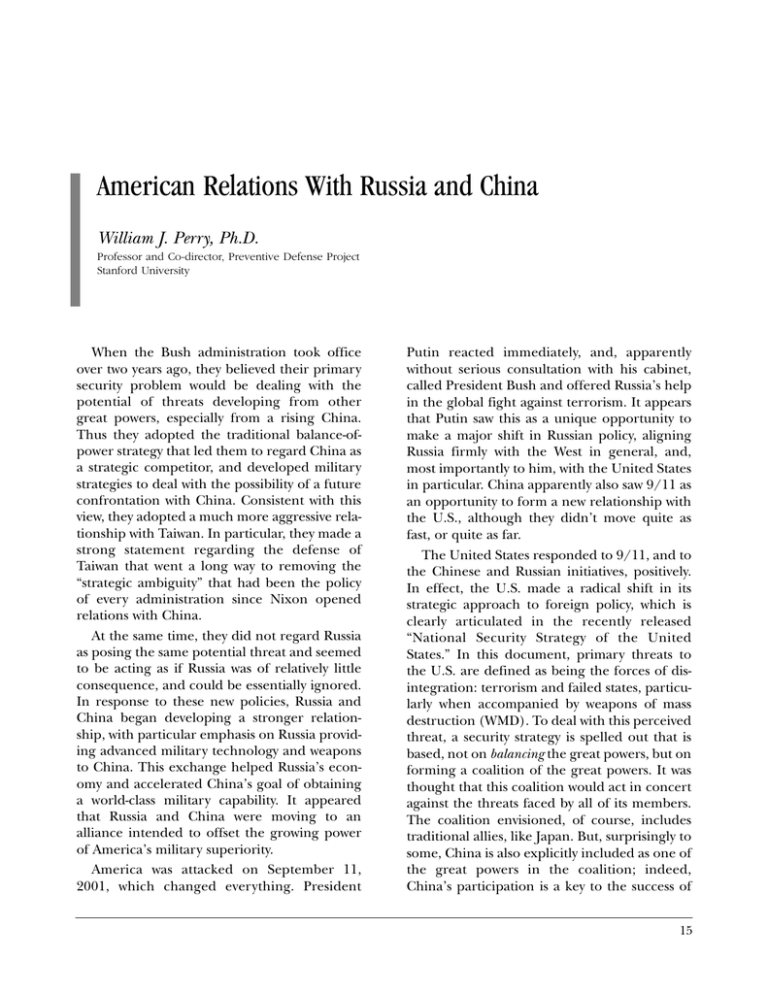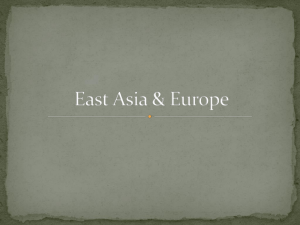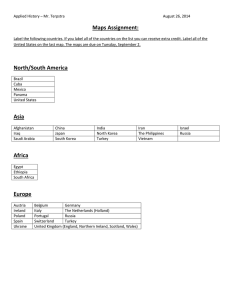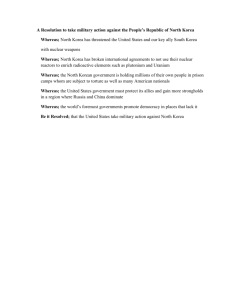American Relations With Russia and China William J. Perry, Ph.D.
advertisement

American Relations With Russia and China William J. Perry, Ph.D. Professor and Co-director, Preventive Defense Project Stanford University When the Bush administration took office over two years ago, they believed their primary security problem would be dealing with the potential of threats developing from other great powers, especially from a rising China. Thus they adopted the traditional balance-ofpower strategy that led them to regard China as a strategic competitor, and developed military strategies to deal with the possibility of a future confrontation with China. Consistent with this view, they adopted a much more aggressive relationship with Taiwan. In particular, they made a strong statement regarding the defense of Taiwan that went a long way to removing the “strategic ambiguity” that had been the policy of every administration since Nixon opened relations with China. At the same time, they did not regard Russia as posing the same potential threat and seemed to be acting as if Russia was of relatively little consequence, and could be essentially ignored. In response to these new policies, Russia and China began developing a stronger relationship, with particular emphasis on Russia providing advanced military technology and weapons to China. This exchange helped Russia’s economy and accelerated China’s goal of obtaining a world-class military capability. It appeared that Russia and China were moving to an alliance intended to offset the growing power of America’s military superiority. America was attacked on September 11, 2001, which changed everything. President Putin reacted immediately, and, apparently without serious consultation with his cabinet, called President Bush and offered Russia’s help in the global fight against terrorism. It appears that Putin saw this as a unique opportunity to make a major shift in Russian policy, aligning Russia firmly with the West in general, and, most importantly to him, with the United States in particular. China apparently also saw 9/11 as an opportunity to form a new relationship with the U.S., although they didn’t move quite as fast, or quite as far. The United States responded to 9/11, and to the Chinese and Russian initiatives, positively. In effect, the U.S. made a radical shift in its strategic approach to foreign policy, which is clearly articulated in the recently released “National Security Strategy of the United States.” In this document, primary threats to the U.S. are defined as being the forces of disintegration: terrorism and failed states, particularly when accompanied by weapons of mass destruction (WMD). To deal with this perceived threat, a security strategy is spelled out that is based, not on balancing the great powers, but on forming a coalition of the great powers. It was thought that this coalition would act in concert against the threats faced by all of its members. The coalition envisioned, of course, includes traditional allies, like Japan. But, surprisingly to some, China is also explicitly included as one of the great powers in the coalition; indeed, China’s participation is a key to the success of 15 this strategy. And Russia was offered a role akin to that of an ally. As a consequence, the U.S. policy, for the indefinite future, will be to seek cooperation, not confrontation, with China. And, as a consequence, the China-Russia move to offset American strength has lost its steam. This change in strategy for the United States, and the corresponding changes in Russia and China, represent a paradigm shift of great significance. While the terrorist attack on 9/11 was the catalyst for this new strategy, it is also true that this change is much more fundamental than a simple response to 9/11, and therefore has the potential to be enduring. With the articulation of this new strategy, the President has “settled” the debate that had been going on in the administration on China policy. Of course, the losers in this debate, who favor confrontation with China, will continue to try to assert their views, and the media will report on those attempts, but I believe that the President will stand firm and that this new policy will prevail. However, U.S.-China relations can certainly be affected by the economic and security contingencies that will continue to bubble up. The new friendship has already been somewhat soured by Russia’s siding with France and Germany in the run up to the war in Iraq. Indeed, many Russian politicians feel that Putin misplayed his hand as a result of the intense “wooing” by French President Chirac. China, on the other hand, while not supporting the U.S., was more subtle in its opposition. China supported the UN resolution leading to the inspection regime that preceded the war. And China did not take a strong stand against the American and British military action. These positions were undoubtedly taken by the Chinese government because they had made an assessment that positive relations with the Bush administration were more important than their standing with France and Germany, whose views were closer to theirs on Iraq. I believe that those actions were appreciated by the administration and will, indeed, lead to more positive relations. 16 Russia, on the other hand, has lost a lot of ground with the administration, and it is not clear yet how and whether that ground will be regained. An administration senior official said that Russia will be “forgiven,” but it may not work out quite that way. But the security issues most likely to affect Russia and China’s relations with the United States are most likely to arise in the volatile AsiaPacific region, most importantly in the ongoing crisis with North Korea. The roles of Russia and China in helping the U.S. deal with the crisis over the North Korean nuclear program When I was Secretary of Defense, I spent almost half of my time trying to deal with the problem of nuclear proliferation. Indeed, the security poster child of the Clinton administration was the Nunn-Lugar program, a program in which we worked cooperatively with Russia, Ukraine, Kazakhstan, and Belarus to secure their nuclear weapons, materials, and technology. But not all nations were willing to cooperate to prevent proliferation; so I also worked to develop coercive programs to deter nuclear-aspiring nations. To that end we applied significant diplomatic pressure and sanctions on India and Pakistan. Those measures failed, with consequences that I fear could, in time, be catastrophic. Additionally, for more than a decade, operating under a UN resolution, we applied painful economic sanctions, diplomatic pressure, and an intrusive inspection program to frustrate Iraq’s nuclear ambitions. Many nations believed that this approach, with some fine-tuning, could be successful. The United States, United Kingdom, and Australia did not share this optimism and went to war to remove Saddam Hussein and his regime. But even as the debates over Iraq were raging in the UN, a new crisis emerged involving a nuclear weapons program in North Korea that was a far more serious problem of proliferation. I say “new,” but in fact this crisis is in many ways a rerun of the Korean crisis of June 1994. That crisis was the only time in my tenure that the United States came close to a major war. We were willing to risk war because we believed that a nuclear weapon production program in North Korea posed unacceptable security risks: 1. At such time as North Korea possessed a significant nuclear arsenal, we feared that its leaders might be misled into thinking that the United States would be unwilling to defend South Korea; and this miscalculation could increase the risk of war. 2. It seemed likely that North Korea’s nuclear program could begin a domino effect of proliferation in East Asia, causing South Korea, Japan, and Taiwan to question their own non-nuclear status. 3. Given North Korea’s record as a proliferator of ballistic missiles, and given its desperate economic condition, we assumed that some of the products of this nuclear program would be for sale to the highest bidders. In aggregate, these issues were sufficiently dangerous that we were willing to risk war. Happily, war was avoided through diplomacy—although it required coercive diplomacy; that is, diplomacy backed with the credible threat of military force. The result of that diplomacy, the Agreed Framework, was far from perfect. But were it not for that agreement, North Korea could by today have 50 to 100 nuclear weapons. Last year the North Korea nuclear threat resurfaced. Since January, when North Korea ejected the International Atomic Energy Agency (IAEA) inspectors, the threat has been obvious. And since the North Koreans still have the canned fuel rods left over from the ‘94 crisis, the threat is imminent—these rods give them the capability of making about five nuclear bombs this year. And their reactors at Yongbyon would allow them to begin serial production of bombs next year. Those bombs would threaten not just the U.S. but South Korea and Japan and, indirectly, China. In effect, we were faced last January with the same problem we faced in June 1994. So why has it been so hard this time to develop a serious diplomatic strategy? Today, as in 1994, the U.S. cannot deal with North Korea unilaterally. In ‘94, we were in total agreement with South Korea and Japan on how to deal with the North Korean nuclear threat. Now, as then, it is clear that any credible strategy absolutely requires a concerted action with South Korea and Japan, and would be greatly facilitated by support from China and Russia. That concerted action from South Korea and Japan, and that support from China and Russia, have not been forthcoming this time around. Why are we five countries so out of synch on an issue of such importance to all of us? United States 1. Clearly the U.S. has been distracted by Iraq. Secretary Rumsfeld has said our military can handle two simultaneous threats, which I believe is correct, but it appears that our political system cannot handle two threats at the same time. 2. It appears that the administration believed that it would be easier to deal with North Korea after it had settled with Iraq. But it is not clear how long that will take, and in the meantime, North Korea is proceeding with its nuclear program. 3. President Bush has said that he “loathes” Kim Jong Il, and apparently does not want to deal with him. I find it easy to sympathize with the President’s reaction to Kim Jong Il, but unfortunately he will have to be dealt with if we are to solve the North Korea nuclear problem short of war. Earlier in history, President Nixon dealt with Mao Tse Tung, presumably because he believed that it was in American security interests to do so, not because of any regard he had for Mao or his ideology. 17 4. Finally, the U.S. is having trouble sharing a common view of the threat with its own allies, and is facing a perception among those allies that it is not treating them as full partners. 3. One reaction to this threat perception is that they are beginning to question whether they can continue to count on the American shield. South Korea 4. They are beginning to move to a ballistic missile defense system, but this is not an adequate solution; and that realization is dawning in Japan. 1. South Korea is also distracted; in their case because they have recently gone through a change in administrations. 2. The new administration in South Korea is inexperienced in national security issues and has scant background in the history of nuclear problems with North Korea. They appear to be able, and presumably will come up to speed on these issues, but there is a question as to how long that will take and how much time we have. 3. Some of the new officials in South Korea believe North Korea would never use nukes against them, and therefore that the nuclear “problem” is not their problem. I believe that this is a naïve assumption, but even if true, consequences to South Korea would be profound even if North Korea’s use or threat of use were against other nations. 4. President Rho has articulated a policy of “No tolerance for nuclear weapons in North Korea,” but this “policy” appears to be empty rhetoric. 5. There appears to be a substantial gap between President Rho and President Bush on the threat posed by North Korea. At the recent summit meeting, the discussions papered over these differences but did not resolve them. Japan 1. The Japanese government had placed great importance to the summit meeting of Prime Minister Koizumi in Pyongyang. That meeting is now generally regarded in Japan as a failure, raising questions about the government’s ability to handle this problem. 2. Unlike South Korea, the Japanese do see the North Korean nuclear threat as real and imminent. 18 5. As a result, some in Japan are beginning to talk about the need for Japan to have an independent nuclear deterrence. If Japan were to move in that direction, there would be serious negative reactions in the entire region. China China clearly shares our basic goals: no war and no nuclear weapons on the Korean Peninsula. But China continues to claim that they have limited leverage, and that they believe that putting pressure on North Korea would be counterproductive. As a consequence, they are willing to convene trilateral meetings, but apparently are not willing to do the heavy lifting necessary to turn North Korea around. Russia Russia, in the first instance, created the problem by providing a research reactor to North Korea. However, later, as a result of pressure from the first Bush administration, they persuaded North Korea to join the NonProliferation Treaty, thereby putting the reactor under IAEA inspection. During the last decade they have provided little or no aid to North Korea and as a result have had little influence. Putin apparently would like to get back in the game, and has taken a number of diplomatic initiatives, including inviting Kim Jong Il to a dramatic meeting in Moscow. Significantly, however, Russia is still providing little or no aid, so their influence will continue to be slight. Like China, the Russians say that putting pressure on North Korea would be counterproductive, and have not supported bringing this case to the security council, as requested by the U.S. They do continue to maintain high-level contact with North Korea, and could be useful as an independent channel of communication to Kim Jong Il. North Korea For several decades North Korea has wanted nuclear weapons. The United States has to this point prevailed against that desire, through a combination of carrots and sticks. Now they correctly sense our disarray and see a window of opportunity. They may very well pass thru that window by the end of this year. What would “passing through the window” mean? 1. North Korea would build up a significant nuclear arsenal. 2. They could conduct a full-scale nuclear weapon test. 3. They would face an economic imperative to sell nuclear weapons or plutonium. 4. Even if they sold “a few bombs,” they would still have enough left to threaten Japan and South Korea. This is a nightmare scenario, but it is not an implausible one. By the time such a nightmare occurs, we will no longer have palatable alternatives available to us. How did we get in this mess and how can we get out of it? I believe that we should not have cut off the engagement with North Korea two years ago. That end to dialogue probably contributed to the present problem with North Korea; in any event it has made it more difficult to deal with this problem. I believe that we should have stated that the reprocessing of plutonium at Yongbyon was a “red line,” thereby defining our diplomacy as coercive diplomacy. And I believe that we should begin serious diplomatic talks as the highest priority. I believe that China and Russia have an important role to play in the ongoing discussions with North Korea—certainly we and they have a commonality of interests in this crisis, but until recently they have been unwilling or unable to do the “heavy lifting” necessary. The Russian foreign ministry has tried to position itself as an intermediary between the U.S. and North Korea. They visited Pyongyang in January, receiving a message of North Korea’s willingness to give up their program with certain American concessions. They passed this message on to the American State Department, but neither they nor the North Koreans received any response. The Russians are frustrated, but say they are still willing to help if their help is wanted. Just last month it appeared that China had come to recognize how serious this crisis could become, and had decided to get off the sidelines and play a constructive role. Early in April news media reported that China had stopped delivery of fuel oil to North Korea, claiming logistics problems. Whatever the facts were on this cessation, it was only a week later that North Korea announced that they were ready to enter into talks with the U.S. on the nuclear problem without insisting that such talks be bilateral. After another week it was reported that these talks would be trilateral and would be held in Beijing. It would certainly appear that the Chinese government played a key role in bringing about those talks. But, in fact, the talks provided no progress toward resolving the crisis; the U.S., for instance, used the meeting for stating their concern with the problem, but did not engage the North Korean representatives. Whatever actually happened at the talks, there are two positive conclusions we can draw: The Chinese government is actively and positively involved; and The North Korean government is seeking to avoid military action and is willing to put its nuclear program on the table to do so. 19 Given those two positive developments, there ought to be a diplomatic way out of the current crisis without war. But a diplomatic way out obviously requires the U.S. government to negotiate, and there is no indication that our government intends to do so. And I have no illusions about the North Korea government, so if we do agree to negotiate, I would expect the negotiations to be contentious and to drag on for some months. Thus, if we decide to negotiate, we should require as a precondition that North Korea freeze activities at Yongbyon while the negotiations are proceeding, and we should be willing to freeze any further military buildup on the Korean Peninsula for that period. 20 The issue of bilateral versus multilateral talks is, in my judgment, secondary. Any such negotiations would necessarily have a very important role for South Korea and Japan, who would have to provide any economic assistance that may be called for, as they did in the Agreed Framework. And any such negotiations could very well include Russia and China, who have a very real interest in a peaceful resolution to the problem and could provide useful assistance. But the essential and indispensable elements are the willingness of the United States to negotiate, and the willingness of the North Koreans, under the right conditions, to give up their nuclear weapons program.







